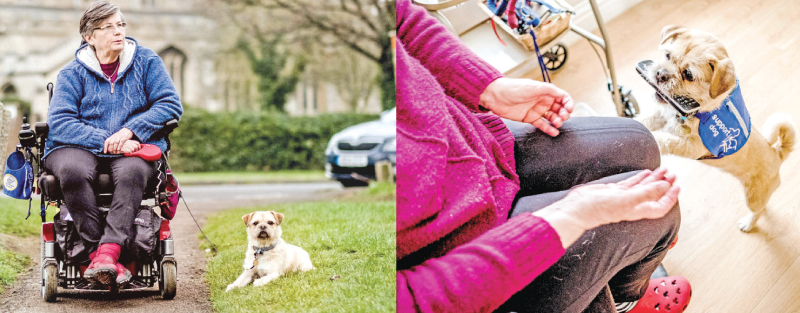He may be small, but he’s mighty! Meet Fudge, Britain’s smallest working support dog – the 13-inch hero who helps his disabled owner by taking her socks off, opening doors, tidying up – and even fetching the TV remote.
Judith Margolis, 67, has been wheelchair bound since 2007 when she was forced to give up her job as a university lecturer because of her condition. But the mum-of-one, who suffers from cerebellar ataxia, says tiny terrier Fudge has saved her life. The clever hound, believed to be Britain’s smallest assistance dog, has been trained to take her socks off, takes her coat off open doors, fetch the TV remote and even soothes the crippling pain her legs – meaning Judith has been able to reduce her medication.
Judith, from Cambridge, said, “Fudge does his tasks which is incredible. He helps me so much on a day to day basis. He’s also an incredible painkiller for me too. He’ll get up and sit on my legs and it’s like having the most amazing fluffy hot water bottle. I’ve even been able to stop using one of my painkillers because of him. He’s a huge confidence booster for me when I’m out and about. He’s the most loving dog I’ve ever had. He’s so loving and affectionate. I think to say that he has saved my life is a cliché but actually, he has.”
Juidth began to develop cerebellar ataxia – a disorder that causes a lack of muscle and coordination control – in the early 2000s and by 2006 was in a wheelchair.
She previously had another support dog, Alfie, a Lhasa Apso who retired. In 2016 she was paired with Fudge, a terrier pug cross rescued by charity Blue Cross who then spent 18 months being specially trained by support pooch organisation Support Dogs. Fudge and Judith are now inseparable, with the tiny pooch helping Judith with everything from taking her socks off, to bringing her the phone, helping undress her and even opening and closing doors. Judith said Fudge can do all tasks other assistance dogs bigger than him can also do – and has even raised the alarm when she’s fallen out of her wheelchair, something he isn’t trained to do.
She said, “I fell out of my wheelchair a few weeks ago while I was out on a walk with Fudge. He’s not trained to alert people but he ran over to the other side of the field I was in and got someone’s attention and then brought them over to me. He’s wonderful and clearly very clever.”
Describing a typical day with Fudge, Judith added, “I get up and Fudge helps me get undressed and brings me my slippers and getting dressed. After breakfast we always go for a walk so he can have some free time. He jumps up on my bench so I can put on his lead and then opens and closes the back gate and off we go to the park. He loves to run free and meet other dogs. He has an amazing recall and comes back when I blow my whistle. He loves his treats so I always reward him when he returns. He loves his ball and brings it back when I throw it.”
Judith even said Fudge has helped her improve her social life and helped her mental health.
She said, “When you’re disabled you become a bit invisible but if you have a dog people come up to you and talk to you so socially it’s made a huge difference. He comes everywhere with me. We’re a team. Because without Fudge I would probably not go out and not see anybody, and I’m quite a positive person, but without people and doing things it’s very easy to sink into depression if you’ve got cerebella ataxia. With a dog I have to get up and go out, and just that pressure alone makes such a difference. So he’s saved my life, really.”
Story Trender



Add new comment